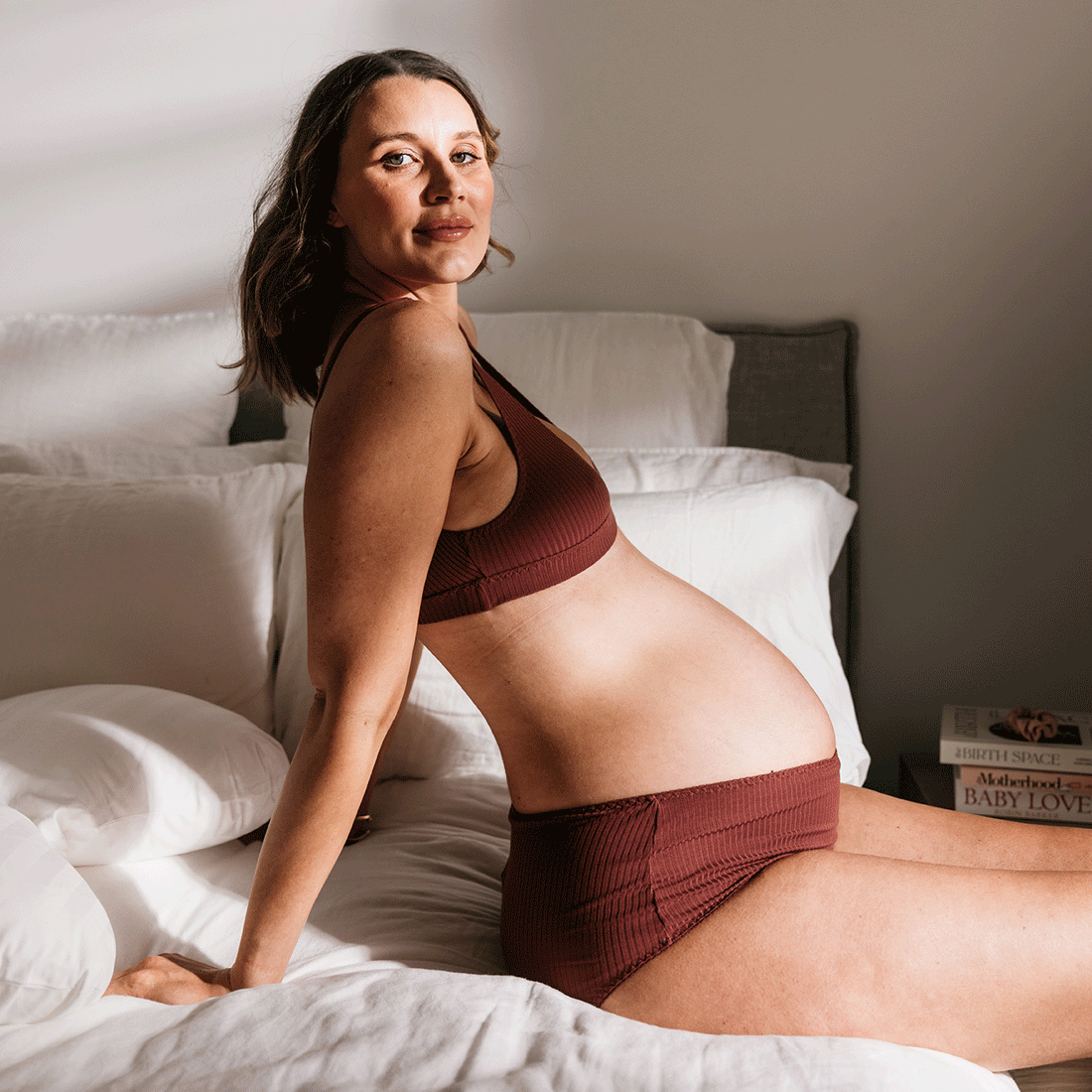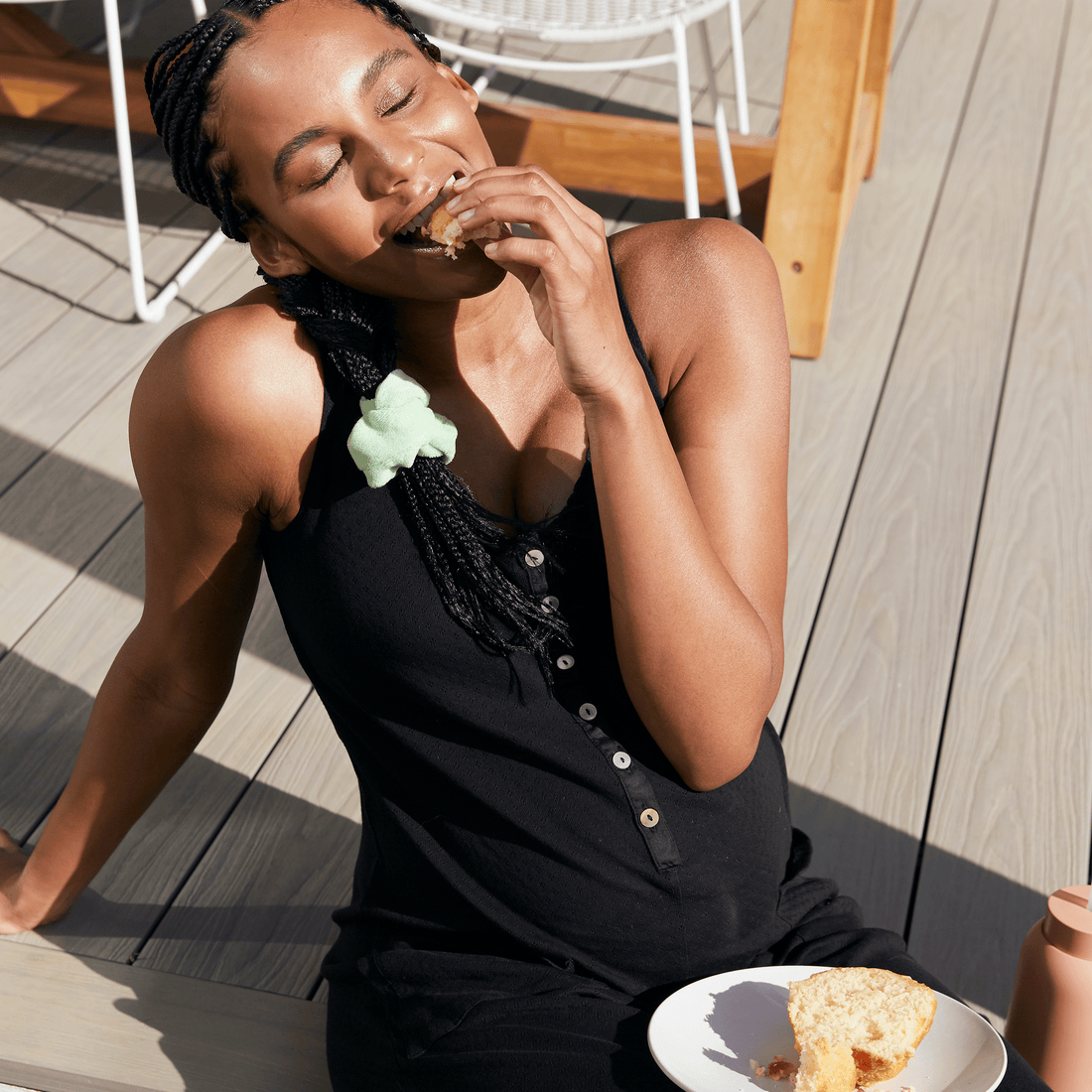Solid gold skin advice from the wizards at Rationale.
Everything changes with pregnancy. Mentally, emotionally, physically and dermatologically i.e. your skin. During pregnancy your complexion can be at it’s best and worst, you can go from needing feather light hydrators to heavy hitting moisturisers and back again. Needless to say, your beauty routine might be flipped on its head, then again, it might not. There are no rules when it comes to pregnancy skin, but there are some common conditions. To figure out how to handle this period of flux, and define the line of what you should and shouldn’t be doing to your face when you’re pregnant, we asked Rationale's National Education Manager, Katie Matten. She’s basically a skin wizard.
Pregnancy Pimples: It's Biology, babe
It’s not your skin care, the weather or your diet, Katie says the changes in your skin are unlikely to be caused by anything other than your pregnancy. “It comes down to hormones, the sebum production and a 40 percent increase in blood volume! These factors enhance luminosity throughout the entire pregnancy, as these hormonal changes deliver an increased amount of oxygen and nutrients to the skin.” Hence, the fabled pregnancy glow. “Generally speaking, most women may experience a few pesky breakouts during pregnancy because of the fluctuation in hormones.”
Dry Skin Pregnancy
Skin changes will vary for all women during pregnancy. Oily skin types become dry, dry become oily - or even balanced (if you hit the jackpot) - breakouts increase and breakouts clear. “Some women who usually experience inflammatory conditions, such as psoriasis or eczema, may find their skin starts to clear because pregnancy induces a state of slight immunosuppression,” says Katie. Anything can happen, so it’s important to give continued attention to your skin and adapt your routine accordingly.
Skin Changes in Pregnancy: The 'mask' of pregnancy
"The biggest changes that women will see is the darkening of pigment,” says Katie. Spots, moles, scars (and nipples) darken due to an increase in estrogen levels which stimulates melanin, a.k.a the skin’s pigment. “Up to 70 percent of women may visibly notice the onset of melasma or chloasma, commonly known as ‘the mask of pregnancy’. It causes brown or grey patches to appear on the cheeks, forehead, upper lip, chin and nose. Darker skin types may be more likely to experience melasma because of the higher amount of active pigment-producing cells. After you’ve had your baby, dark spots will fade in a few months and melasma or chloasma usually fades as hormone levels return to normal and melanin production reduces, but not always.” For this reason, it’s best to wait out your pregnancy and address any withstanding pigmentation after your skin has had a chance to get back to normal.
SUPER SCREEN
Ask Katie what pregnant women should use on their skin? “SPF protection, always.” Sun protection is always essential, but especially so during pregnancy. “Whilst we know the harmful effects of UV, the effects of visible light and infrared have a detrimental effect on melasma and chloasma. Visible light will encourage an over-production of pigment, whilst infrared will result in inflammatory concerns, encouraging the excessive production of melanin. So full spectrum SPF protection is vital for the maintenance of skin health, and will also aid in protection from various skin concerns.” Her pick? Rationale Superfluid SPF.
Pregnancy Skincare: Pro Treatments
Amazing news: Rationale’s signature treatments are safe and recommended for pregnancy. What a delicious reason to lie down and relax! Katie says pregnancy treatments focus on reducing inflammation by building the skin’s resilience and brightening the complexion with antioxidants. “We like a gentle combination of gentle hydroxy acids, such as pyruvic acid, and antioxidants, particularly Vitamin C.” She also recommends B-group vitamins. “These enhance our immune cell activity, inhibit excessive melanin transfer and regulate oil flow. They are our skin’s maintenance vitamins and work for all skin types and concerns. B-group vitamins will build skin resilience, increase moisture, brighten the complexion and fortify our skin’s barrier.”
THE NO-NOS
“Prescription oral and topical Vitamin A, and oral Salicylic Acid (Aspirin) should be avoided during pregnancy,” says Katie. Easy.
BOOBS AND BUMPS
Pregnancy is definitely a time to give the skin on your body a lot of love. “During pregnancy, we recommend using lipid-rich products to use on expanding skin, both bumps and boobs,” says Katie. “Vitamin E is highly nourishing for the skin, it increases our natural moisturising factors, and blocks the formation of harmful free radicals, keeping the skin hydrated and protected to minimise irritation and stretch marks.”





















